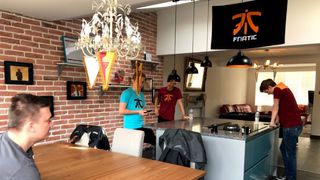
In the middle of a suburb in North-East London sits a white, three-story semi-detached house seemingly like every other in the street. However, the moment you step over the threshold and you’re greeted by an AS Roma doormat and a multitude of Fnatic and AS Roma flags. Unlike the other houses in this street, this one is inhabited by the AS Roma Fnatic FIFA team - the leading esport organization’s pro FIFA team.
Last week, the AS Roma Fnatic players moved from their respective countries and into the modern five-bedroom house (worth a cool £700k/$1m/AU$1.3m), which includes a hot-tub, a top-of-the-range gaming shed for training and streaming, pool table and widescreen TV. We caught up with the players over a game of pool, to see what it’s like living and working with your teammates and competing at a professional level.
Team basics
AS Roma Fnatic is a division of Fnatic, one of the leading esports organizations in the world. Assembled over the past year, but originally launched two years ago, the current roster is made up of four players: Rannerz from Ireland, Damie from Poland, Zimme from Sweden and Insa (who is the only one that doesn’t live in the house) from Italy. In addition, the team’s manager Colin (a.k.a Cojo), who hails from the US, and coach Enzo, from France, also live in the house.
So it’s pretty cozy.
All the players are in their early twenties and late teens, and were previously flying in from their home countries to attend competitions. Fnatic’s management decided moving the entire team into one house would allow them to focus on training, streaming and competing in the run up to the release of FIFA 19.
Despite living in the same house and playing for the same team, each player had a different route to AS Roma Fnatic.
Manager Colin was previously a university student in Kansas, but had always been a soccer fan and a big gamer. His introduction to the competitive scene was with Halo 3, but he later became involved with FIFA content creation, which led to him running and organizing FIFA Pro league. During this time, Colin met a lot of professional gamers, but quickly realized there weren’t many esports managers.
Get daily insight, inspiration and deals in your inbox
Get the hottest deals available in your inbox plus news, reviews, opinion, analysis and more from the TechRadar team.
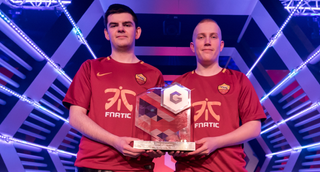
"All this time, I was thinking to myself 'none of these players have agents',” he tells me. “All these clubs were picking up these players but there was no one to represent them, to make sure they're getting good deals and to make sure their contracts aren't exploiting them – which unfortunately in esports is an all too common thing."
Colin began the process of gathering players to manage, picking up between 10 and 12 initially. Next came the hard part: finding a soccer club to back them. After sending out hundreds of emails to various clubs, one of the responses came from the Italy-based Roma, who had an existing relationship with Fnatic. After both parties agreed to a collaboration, As Roma Fnatic was born.
“I feel like we've grown stronger ever since then,” Colin says. “Over the past, almost two years now, I've expanded and now manage the Rocket League and Street Fighter teams as well. It's been a long road.”
In addition, bringing the player’s together under one roof was also Colin’s brainchild – with both management and the players expecting 2019 to be a big year for the team.
"I first put the idea of a house ten months ago,” Colin explains. “At the time, the team wasn't at a point where we felt it was necessarily time to get a house – I don't think we were as competitive as we wanted to be.”
“I think now we have a team we're really confident in, so we wanted to put the guys in the best position possible to succeed this year. And with other team houses such as DOTA and League of Legends, we see positive results so we thought we would bring that strategy into FIFA."
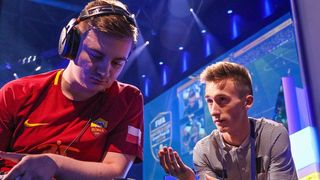
While Colin macromanages the team, researching signings and keeping everyone on track, it is coach Enzo who micromanages gameplay strategy.
Enzo began coaching esports in his home country of France at the age of 14. However, realizing he was a bit too young to be doing so, he moved into coaching youth football for a few years instead.
His return to professional esports coaching came with FIFA 17 when, as a free agent, he applied to be AS Roma Fnatic’s analyst (which he admitted to unfortunately misspelling in his application). Although Enzo coaches the team full time, he’s still studying at a university in France and is in his third year of a sports management degree – luckily his work with the team is a valid excuse for skipping classes.
Enzo has three players to coach in the house: Rannerz, Damie and Zimme. Swedish-born Zimme previously played for pro teams before, and even turned down Roma two years ago, but when his contract with esports team Red Reserve expired he decided it was time to make the change.
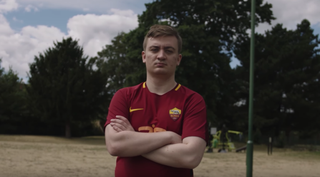
Polish-born Damie, on the other hand, admits he "came to FIFA out of nowhere.” Damie didn’t play FIFA professionally until FUT Champions, a competitive game mode introduced in FIFA 17, became a feature. At the same time, Damie moved to London with his family, then enrolled in a college until he began playing FIFA 17 with a view to becoming a professional esports player.
Fortunately the time sank into FIFA 17 paid off, and Damie earned third place in his first ever professional event.
"From that point I was like 'I really enjoy playing FIFA so this is my time',” Damie explained. “When FIFA 18 came out, everything changed. I played so good. I knew people were starting to know me as a player. The whole year was almost perfect, it's like a perfect story – I just came out of nowhere."
In addition to his expertise in FIFA, Damie is also close to the highest rank in League of Legends and Counter-Strike. When we asked why he didn’t go pro in either of those games, his reply was simple: "I wasn't good enough."
Similar to Damie, Rannerz, from Ireland, didn’t start playing FIFA 17 until FUT Champions was announced. However, unlike Damie, Rannerz played the game for a year and didn’t qualify for any events. It was only with the release of FIFA 18 that Rannerz hit his stride, achieving 38 wins and a top 25 placement in the leaderboards within the first week of release. He was then drafted in the Gfinity tournament and signed a proper contract with AS Roma Fnatic.
Stick to the schedule
Five young gamers moving into a house in a foreign country may seem like a recipe for disaster, but it’s manager Colin’s job to keep the players’ eyes on the prize. He has devised a rough day-to-day schedule for the players, which will be implemented when FIFA 19 releases. The schedule varies week to week, but it essentially sets four-hour blocks that tell the guys when they need to be practicing or streaming.
Other blocks include coaching sessions with Enzo, in which he runs through concepts, formations and opponent preparation, Gfinity review sessions, which see the team breaking down the positives and negatives of the previous week, prep sessions for tournaments and media trips.
But it’s not all work. Once a week Colin schedules a team-building activity for the players to do inside the house and outside the house. As the team is still fairly new to England, activities include visits to Alton Towers, Thorpe Park and even Stonehenge, while last week’s indoor activity involved watching an episode of Manchester City’s All or Nothing series.
It’s not a typical 9-5 schedule, and many of the players will be streaming late to accommodate their fans globally, which means scheduled activities don’t start until after noon.
"It's not the kind of job where you wake up at 9am," Colin tells me. "It’s because of the way our sleep schedules are and because some of the best streaming hours are a bit later."
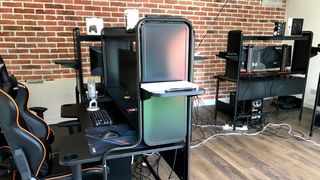
House rules
As expected, there are rules which come with an arrangement such as this. One is that none of the players can stream in their rooms after 11pm in case it disturbs their neighbors. Another is that, while family and friends can visit London and the house, people cannot stay over as there isn’t enough room. However, partners are allowed to stay for a couple of days – as long as they don’t interrupt the schedule.
So how does Colin stop everyone from getting on each other’s nerves?
“That's what team building is there for because it centralizes those activities,” he explains to me. “I think these guys all get along, and that was a big part of putting the team together too. I got guys who had personalities which fit together as well as gameplay abilities which matched our ambitions.
“I've had teams before, which had internal strife and we've had to either change the roster or take drastic steps to figure the roster out, but I wouldn't have gotten this house if I had one of those rosters where I was confident they would get along and treat this as a job.”
“These guys understand this is their job, their livelihood and they're being paid a salary. We're paying for this house every single month not for them to hang out and have fun, but because we think it will help them become better players."

Moving up and out
In addition to the general struggles which come with moving five young men into a house together, there’s also the reality that they each have moved from their home countries to somewhere completely new.
"For me it was quite hard to be honest,” Zimme tells us. “It's just because it's different. But then I decided that I really wanted to move because I wanted to still compete at a high level and I think I can really improve from here."
I asked Colin how he, as the manager, deals with instances like Zimme’s. In this case, the pair spoke one-on-one about Zimme’s concerns, and Zimme also spoke to the Fnatic boss Patrik Sättermon – who is also a Swedish-born former player living in London.
The homesickness struck a chord with us, considering the pressure these young guys are under, and we wondered how much is being done for their mental health alongside their physical wellbeing.
“We're actively looking into the psychology stuff right now because we've used ones in the past for different teams but we've never used one for FIFA specifically,” Colin tells us when we ask whether they have a team psychologist.
“Same on the nutrition side. One part of their schedule is we go to the gym two times a week, mandatory. The third time is optional, but there's set times for those. It's at least six hours a week at the gym. There's a lot of different aspects we can still get better at and work on."
In instances of extreme homesickness, players can return to their homes as long as there isn’t an event on.
“As long as they're meeting their obligations every month in regards to streaming and practising then I'm not, like, a dictator because I think their mental health is as important as their physical and competitive health,” Colin explains to me. “I think sometimes it's just nice to go home for a few days."
In addition, Colin has set aside three to four weeks during the holiday season for the players to return home and spend time with their families to “reset mentally”. But until then, Colin is surrogate mother - cooking for his team three days a week, mainly Mexican food.
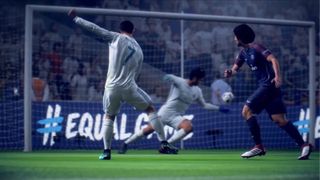
FIFA 19
FIFA 19 will bring many changes to the game, resulting in the team having to shift their strategies and gameplay to fit the new meta. But there’s not long to adjust, the Gfinity tournament is only a month away giving the team little time to adapt.
But has playing FIFA at a competitive level ruined their love of the beautiful game? Apparently not.
"With FIFA 19, I think it'll be fun because it's the new game,” Colin explains. “Speaking for myself, we're in FIFA for a reason. We love the game and we care about the game, even when it's not in its best state and when it is in its best state.
"I think a lot of these guys see this as a career that they can take long term so there has to be some sort of passion there."
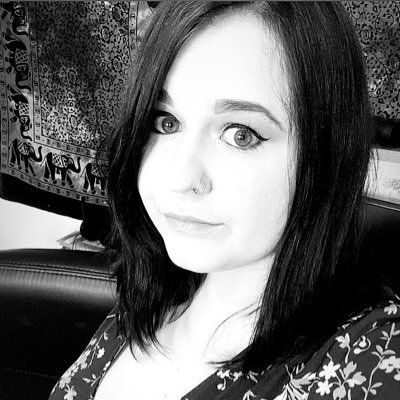
Vic is TechRadar Gaming's Associate Editor. An award-winning games journalist, Vic brings experience from IGN, Eurogamer and more to the TechRadar table. You may have even heard her on the radio or speaking on a panel. Not only is Vic passionate about games, but she's also an avid mental health advocate who has appeared on both panels and podcasts to discuss mental health awareness. Make sure to follow her on Twitter for more.
